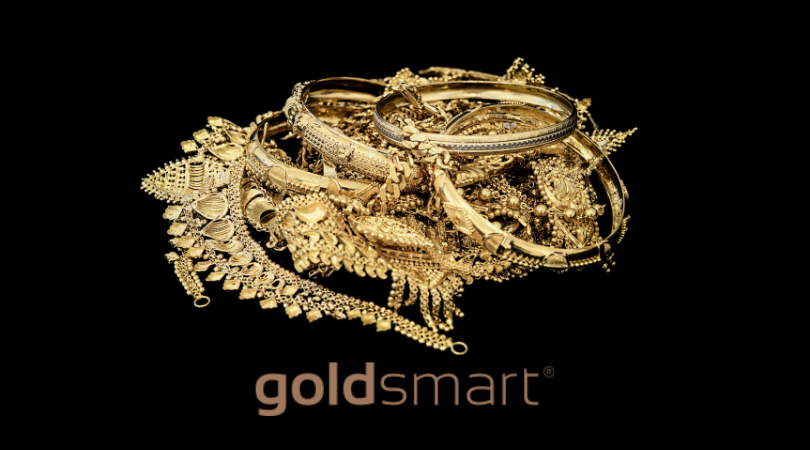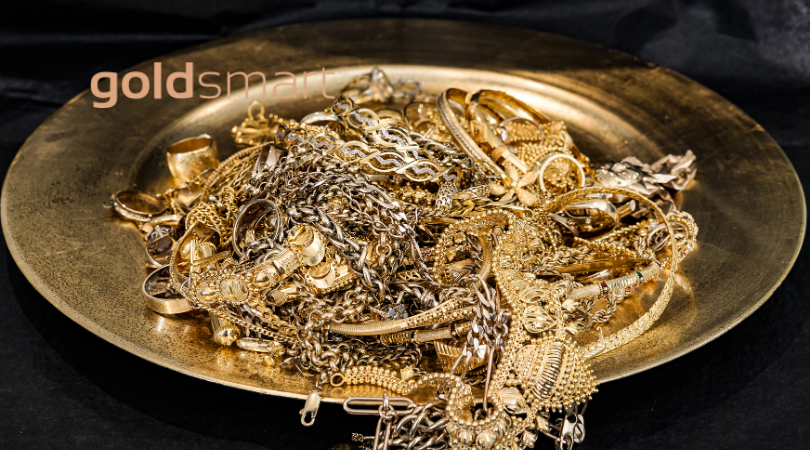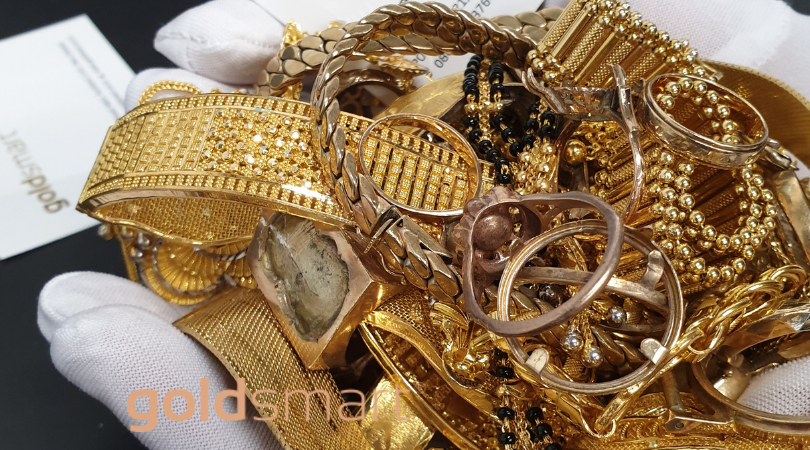
Most people are familiar with the idea that precious metals are worth significant value. Whether it’s silver, gold, or palladium, things made of these metals will continue to have worth even if they aren’t functional anymore as an item simply because of the metal’s value itself. This is because precious metals can be melted down and reformed into new items with similar or greater value. This is the fundamental principle driving the demand for scrap gold. Note, second-hand scrap gold is not garbage. While there is a market for gold recovered from other items such as computer motherboards, scrap gold is really generic term for any gold that is not wanted anymore but still has value for its metal alone.
The Ideal Scrap Gold for Selling
Not all gold works for selling as second-hand. A key factor involves the gold being clear of any other embedded or attached materials. Precious stones, for example, are a big issue. A good amount of jewellery involves gold with stones set in them. In these cases, the jewellery is a combination of the value of the metal as well as the stones, and not every gold buyer is prepared or interested in dealing with products that ultimately will end up in too different markets. Stones cannot be melted and consolidated with other stones. They are units in and of themselves. So jewellery with inlays and similar is not going to qualify for the best second-hand gold-selling possible.
Broken jewellery is a common type of gold bought. The pieces tend to involve earrings, rings, bracelets, and necklaces. As long as they are solid gold in any form, from 10 carat to 22 carat, the gold is worth value and can be sold to a gold buyer for cash. Obviously, the higher the carat quality of the gold, the more that it will sell for based on weight, quality, and the current market price for gold. These items are then sorted and put together with similar gold to be melted and reused again by the gold industry, whether it be industrial or as new jewellery or as bullion.
Other types of gold might be useful as well, as long as they are in solid pieces. Gold nuggets, for example, have a high quality of gold purity and when confirmed on the quality will usually sell for a sizable return. The quality value can range from 20 carats to 24 carats, mainly because the nugget is a pure form of the metal unadulterated with any other material or metals such as alloys to make the gold stronger for daily use. Usually, gold nuggets come from a couple of sources: either they are attached to a chain in the form of jewellery, they are found in the wild, or the nugget is bought from someone else. In every case, the nugget has been mined out of the ground and simply not smelted down yet into refined gold.
Gold coins, medallions, commemorative medals, and similar, plaques and pens are common enough that they show up. These are items that people typically have won or been awarded with due to a great accomplishment in life or career. Sometimes they are sold by the holder, sometimes they appear in an estate, and many times collectors who’ve had them decided it’s time to sell these items for their metal value as well.
Scrap gold can include gold fillings, which are in essence chunks of real gold that were used for teeth protection and filling cavities. People have tended to hold onto their gold fillings even after they fell out because of the value of the metal itself. Most of the time this shows up in estate holdings because gold stopped being used for dental work a long time ago, but it does appear once in a while.
Industrial gold is a newer type of scrap gold showing up as well. This particular type is a bit more difficult for people to sell, however. Most times it is industrial recyclers who are recovering gold from technology parts. However, it can happen that gold is used in wiring or in electronic parts. If separated completely and in its metal form only, it can actually produce some worth as well. But it’s not common for a household to have this kind of gold available for recovery.

What Scrap Gold Is Not
A key type of item that definitely does not count as scrap gold is gold-plated jewellery, coins, accessories, and similar. These are quite common in just about every application of metal goods, and gold-plating can be produced with a variety of procedures. Some of it looks extremely good and similar to real gold, but it is not. A simple check with removal of the surface will immediately show the base metal underneath.
Gold foil is also not going to be reliable as a form of scrap gold. While it is, technically, gold, it is so thin and insubstantial, there isn’t much to work with that would actually be valuable. Worse, in almost every application of gold foil, it adheres to some other material like wood or plastic. Even trying to heat off the gold in its minuscule amounts would end up creating a fire hazard in the process. No one wants to even deal with the hassle, so it’s not considered.
Getting Ready to Sell
Once a person has their scrap gold generally identified and collected, it is a good idea to prepare for the selling process.
First, any paperwork that actually identifies a particular item such as jewellery is extremely helpful. Documentation can cut through a lot of testing and guessing if an item is fully explained and sourced. It will still be tested for gold content because there are plenty of characters out there faking documents to pull a fast one on gold buyers, but the testing is simply to make sure the piece and documents are in fact true and accurate.
Second, any items with clear detail, markings, or prints on them describing their gold type is ideal. Gold bullion coins, for example, are very much in demand because they have been measured by a government issuer and typically have the exact weight stamped on them permanently. Fine jewellery will have its maker’s mark, a hallmark, or a stamp of gold type on them in some code form or lettering. These details also help delineate the type of gold involved.
With the above and the known paperwork, the scrap gold should be segregated into piles for their common quality. In other words, everything that is 10 carat gold should be in one bag, everything 18 carat gold should be in another, and so on. This helps the buyers tremendously instead of fishing through a giant pile and doing the sorting during the evaluation process. Good buyers will still confirm each piece, but having all the 14 carat items together just makes the process move along smoother.

Where to Sell
There are more than a handful of agents and businesses that will buy scrap gold. However, there is a wide range of usefulness and service between one buyer and the next. Generally, they tend to fall into categories as follows:
- Private temporary buyers – these are characters who show up in town for a few days, offer cash for second-hand gold, and either work out of someone’s home at a “gold party” or from a hotel meeting room in town. Within about two or three days they are gone. They rely on people’s interest in immediate cash and often buy gold well below what it is worth.
- Pawnshops, payday loan offices, and fast loan shops – these businesses are a bit more stable in that they have a physical address, but they buy scrap gold as part of their overall business. Their goal is always to buy items well under what they are worth and again rely on people’s need for immediate cash to make their service appealing.
- Jewellers – Some jewellery dealers will buy used gold jewellery, rings, and bullion, but they many times are not geared for the process. They will immediately hand the gold over to a consolidator they work with and will want to make a profit between what they buy and what the consolidator’s price is. They frequently will not deal with all types of gold, focusing just on “sure” pieces and coins.
- Professional gold buyers – These are businesses that are well-established in the gold buying market. They can oftentimes be consolidators as well. However, unlike consolidators, professional gold buyers will handle smaller, personal lots as well as larger gold lots, providing a dependable channel for gold selling. Because professional buyers are well-connected as feeders to consolidators, they are able to command good pricing and pay well for the gold they buy.
- Consolidators – These are the folks who actually take multiple lots of the same type of gold and perform the melting process. They then take the smelted gold and typically reform it into ready bars that are then recirculated back into the gold market to bulk metal buyers. They deal with so much gold per lot, most do not have time for smaller personal collections.
Local New Zealand Help
Gold Smart has been a long-established professional buyer of second-hand and scrap gold for years. Our process is secure, safe, reliable, and transparent. We don’t involve any hidden fees, sellers have full discretion to commit or not to sell, and one is ever pressured into a sale they don’t want to be involved in. Our buyers patiently work with all customers, and we would rather educate them on how gold-selling works than just push another sale through. That’s the reason why most of our customers are return accounts who keep coming back for the high-quality service Gold Smart provides. Find out more, give us a call or email and we can get started evaluating your scrap gold today.